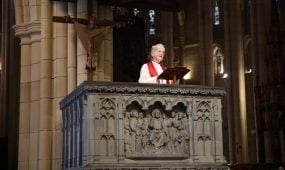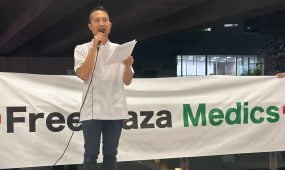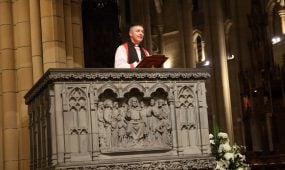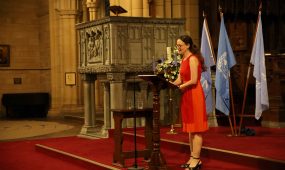Synod sermon – Friday 24 September 2021
Homilies & Addresses
“As we gather for this Synod I wonder what ‘strange land’ you live in? As individual people, things happen in life that can cause us to feel lost, and in a strange land, and they include the experiences of love, grief, injury, disease, ageing, and unemployment…But collectively, as a denomination of Christian faith, I think there are at least three elements of ‘strange’ in the ‘land’ we currently live in,” said Bishop Cam Venables in his sermon during Friday night’s Cathedral Synod service
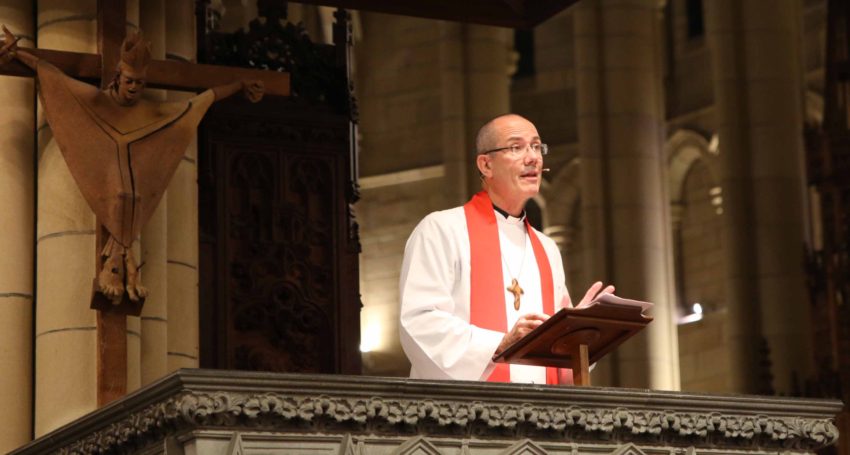
In the name of our loving liberating and life-giving God, + Father, Son and Holy Spirit. Amen.
Sisters and brothers, we gather this evening on holy ground in this Cathedral, and we come representing Anglican Parishes, Anglican Schools, and the community service ministries of Anglicare. We have come from the holiday meccas of the southern region, the retirement villages of the north, and the farming communities of the west! Of course, there are other things that happen in these regions, but I thought I’d start with these!
Some of us are young, and some not so young! Some were born in Australia and speak only English, while others were born in other countries and speak more than one language. Some have previously been to Diocesan Synods, while for others this is your first…and, if this is your first Synod – please know you are among friends.
It is good to be gathered here: to pray, sing, and break bread together before the intensive times of discussion and decision making that will shape our weekend.
Whenever we gather for Anglican worship we listen to readings from the Bible, trusting that God’s Spirit will speak to us through them – so the responsibility of the preacher is significant! Whether to a small congregation, or a large celebration like this, a preacher is called to offer something that is, in God’s grace, life-giving and I pray that this be so now.
So, let’s start with that poignant question from this evening’s Psalm, ‘How can we sing the Lord’s song in a strange land?’ Before bringing our own experiences of ‘Lord’s song’ and ‘strange land’ I think it will be helpful to touch base with the context that inspired these words of longing and to do this this we need to go back two and half thousand years.
Advertisement
King Nebuchadnezzar, who created the famous hanging gardens of Babylon, brutally crushed a Jewish rebellion in 586 BCE. He destroyed the Temple in Jerusalem, blinded King Zedekiah, and forcibly took the majority of surviving Jews into exile. He took the most educated and wealthy, those who were community leaders in business and religion, and left behind in Jerusalem only the poorest people.
‘How can we sing the Lord’s song in a strange land?’ is the question asked in the midst of lament. How can we be followers of God when the Temple in Jerusalem has been destroyed, and we struggle to speak the language of our captors? This may sound like an experience of oppression from long ago but we are blessed to have in our congregations, and in our communities, people who have been similarly forced to leave the lands of their birth in fear of their lives. People who have had to negotiate the tough journey of learning another language and adapting to the laws and cultural expectations of their adopted country. I think particularly of diaspora Anglicans who have come from South Sudan, Sri Lanka, Burundi, and Syria.
We understand that seventy years after the Jerusalem Temple was destroyed, King Cyrus of Persia defeated Babylon and invited the Jews of that city to return to Jerusalem… but surprisingly, the great majority chose to stay. American Rabbi Joseph Telushkin suggests that the best Jewish minds stayed in Babylon and sent money to help with the rebuilding of Jerusalem (2001, p.82). He also notes that most Jewish scholars regard the Babylonian Talmud as being richer and more comprehensive than the later Jerusalem Talmud (2001, pp.151-152). So, the Jewish diaspora in Babylon helped to finance the rebuilding of Jerusalem from a distance and continued to excel in scholarship for centuries.
Advertisement
We can conclude from this that they had learnt to sing the Lord’s song in what had been a strange land but was strange no longer. I think it’s helpful for us to bear this in mind as we consider our own experiences of ‘strange land’: the Jews in Babylon learnt a new language, adapted to life in a new culture; they flourished, and enabled others to flourish.
As we gather for this Synod I wonder what ‘strange land’ you live in? As individual people, things happen in life that can cause us to feel lost, and in a strange land, and they include the experiences of love, grief, injury, disease, ageing, and unemployment…But collectively, as a denomination of Christian faith, I think there are at least three elements of ‘strange’ in the ‘land’ we currently live in:
- The first is that for quite some years our membership, on the whole, has been declining. We can no longer assume that people will come to church on a Sunday, because people now find community in other places. Together with this there is an understandable wariness about religious institutions, and of those perceived to be in authority. So, how do we sing ‘the Lord’s song’ in an increasingly secular society that is wary, and sees little value in what we offer?
- In March last year we entered another ‘strange land’ shaped by COVID-19 infection and restriction. We were not allowed to physically meet for months, and when we were allowed to meet again the smell of hand-sanitiser, the experience of singing while wearing a mask, and the demand to physically distance…has changed our experience of worship. Most people here have not been able to taste wine in communion for the last year and a half; we have not been able to grieve at funerals in the way we used to; and we have not been free to travel. We have learnt the new language of ‘liminal spaces’, ‘pivoting’, and ‘hybrid church’ and have found that ZOOM is a meeting place as well as a verb! ‘Though strange, exhausting, and stressful…and ‘though there is a long way to go before we discover what the new normal will be…the last eighteen months have also been a time of great innovation. Many have developed greater competence in digital communication so we now gather for worship and teaching online – offer pastoral care and prayer online – and have effective governance meetings online. Indeed, we have communication tools that previous generations did not have, and we’re learning to use them more effectively.
- The third aspect of ‘strange land’ I want to name is not the social distancing caused by COVID-19, but the theological distancing that polarises our National Church. I wonder if you identify with a particular theological tribe, and if you do what you think of those in the other tribe? Sadly, this theological distance and difference can cause us to think less of those we consider ‘other’ because they name their understanding of faith differently to the way we do.
This is not a new thing in religious faith and was clearly evident in the Judaism that Jesus grew up in and was formed by. There were the Sadducees who thought that faith was all about sacrificial worship in the Temple, and the Pharisees who thought that faith was all about following a particular interpretation of the law.
Both Sadducees and Pharisees defined who was in and who was out; what was acceptable and what was unacceptable…and frustratingly for both of these leading groups Jesus reached out to those they deemed unworthy, while affirming them to be known, and deeply loved by God.
How do we sing ‘the Lord’s song’ in the ‘strange land’ created by theological difference and division? It is quite possible that each theological tribe names ‘the Lord’s song’ – the Good News – in different ways and this is significant. So how might we touch base with that naming?
‘Who do you say that I am?’ Jesus asked his disciples in Luke’s Gospel. It is a brilliant question, and how we respond to it will shape our understanding of what ‘the Lord’s song’ is. We have a good sense of how Peter responded, but how would we respond if asked that question? What words would we use?
In our informal conversations this Synod, both masked and unmasked, could we helpfully ask each other a variation of the question – ‘What does Jesus mean for you?’ and then respectfully listen to the response. Really listen to each other! Not asking the question to score points but rather, to better understand ‘the other’ and perhaps pray for God’s blessing upon them.
The vibrant church in First Century Corinth was clearly a theologically divided community. One group who spoke in tongues had concluded that they were better than the rest because they had a particular spiritual gift, and that consequently they were closer to God! One can only imagine Paul shaking his head as he addressed the conflict in a letter affirming that we can have all spiritual gifts and be as generous as it is possible to be…but, if we don’t live with love it means nothing.
Then he went on to describe love, in words that we often limit to a wedding ceremony. Paul was writing to the whole church in Corinth and in many ways to the Church through the ages to this time. He suggested that love is patient, and kind; it is not envious, boastful, arrogant, or rude. That love does not insist on its own way and is not irritable or resentful; it does not rejoice in wrong-doing but rejoices in the truth. It bears all things, believes all things, hopes all things, endures all things…and never ends.
What love will we offer each other this weekend as we listen, and debate, and make decisions? And what part does God’s love play in our understanding of ‘the Lord’s song’ and our offering of that song to a hurting world? For the three aspects of strangeness I have described are significant for us as we look inwards at ourselves as a Church, but what do we recognise to be ‘strange’ as we look out at the wider community in which we live?
For surely, we are called to sing ‘the Lord’s song’, and we do our best to sing it, in a country where there continues to be systemic disadvantage for Aboriginal and Torres Strait Islander people? Where all the sociological indicators suggest that ‘the gap’ is not closing but getting wider. In our Diocese the little community of Cherbourg this week made public their grief at the 10 suicides within that community over the last year; and of the more than one thousand children cared for by our Anglicare staff tonight more than four hundred are from Aboriginal or Torres Strait Islander families. In this complex and ‘strange land’ who is best singing the Lord’s song of hope and reconciliation…and how can we learn from them?
And…in a society where one in three Australian women have experienced physical or sexual violence, and an average of one woman each week is killed by a current or former partner. How determined are we in singing ‘the Lord’s song’ of liberation, peace-making, and cultural transformation?
And…in high schools where at least one in four students live with a diagnosed or undiagnosed mental illness; and in our communities where we are told there is an ‘epidemic of loneliness’…How imaginatively are we singing ‘the Lord’s song’ of hope, healing, and care?
And…in the lived reality where so many are homeless, and where housing is increasingly less available and affordable: How generously are we singing ‘the Lord’s song’ of justice, shelter, and care?
And…in a political environment where refugees and people seeking asylum are too often abandoned, incarcerated, and misrepresented: How courageously are we singing ‘the Lord’s song’ of welcome, love, and friendship?
And…finally, in a world increasingly impacted by climate change and extreme weather events: ‘How wisely are we singing ‘the Lord’s song’ of faithful stewardship and love of neighbour?
In God’s grace…this weekend:
May we hear ‘the Lord’s song’ in our time together,
and may the love of Christ be the melody between us;
May the Spirit of God inspire both rhythm, and lyric,
and may we recognise new opportunities for harmony;
May we sing together,
and even…
dance!
Amen
Joseph Telushkin, 2001, Jewish Literacy, William Morrow and Company Inc: Toronto, Canada.

